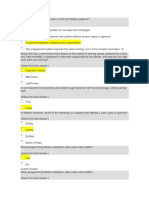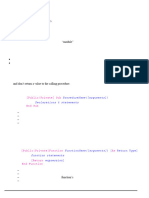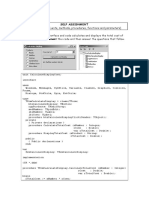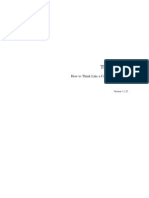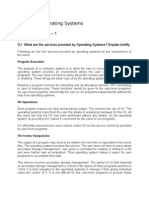Notes For Structured Programming, Procedure and Function: Components
Uploaded by
vinaksha4567Notes For Structured Programming, Procedure and Function: Components
Uploaded by
vinaksha4567Notes for Structured Programming, Procedure and Function
By Tony Chun Kuen WONG (summarized from Chapter 8)
A) Modular Design Philosophy
If you own a stereo system, you are probably familiar with the concept of
components. A typical stereo system, for instance, includes a receiver, a tape deck,
a CD changer, and speakers. Manufacturers know that if they provide each
component separately, then consumers can mix and match the components as
necessary. Component stereo systems are also a more attractive alternative than
integrated systems (one-piece systems) because they can upgrade by simply
purchasing a new component. For example, you can easily replace a 3 CD-changer in
a component system with a 10-CD changer. Additionally, as technology improves and
new components become available, they can add to the system.
A stereo system component is analogous to a unit in the world of Object Pascal
programming. Modular programming refers to computer programming that is
based on a modular, or component-based, design that relies on code units.
Structured programs are programs that contain control structures, such as
decision and repetition structures, and execute statements sequentially; they typically
contain subprograms and may be modular in design. Thus all programs written in
Object Pascal are structured programs, because the language itself is highly
structured. Furthermore, all Windows applications written with the Delphi IDE are
modular programs, because the code for each form appears in a separate unit.
Modular programming offers several advantages. First, it allows the programmer to
logically organize a program by dividing the problem into smaller subproblems.
Repeatedly using this "divide and conquer" technique to solve a problem is
called Stepwise refinement and is part of the top-down design programming
methodology. For instance, a programmer may write a program consisting of three
subprograms : one subprograms contains the input routine, another performs
calculations, and final subprograms display the output. Second, modular programming
enhances the readability of the code and simplifies the debugging process. Third, as
with the components in a stereo system, a module can be easily replaced (or
upgraded) to improve the program. Finally, modular programming allows for the
reuse of code. Code reuse is an important aspect of computer programming. Once a
programmer writes a subprogram that performs a certain task, there is no need to
rewrite this subprogram in every application that requires it; instead, programmers can
simply reuse the existing code. This philosophy of reuse reemphasizes the importance
of adequate documentation, which must specify the required subprogram inputs and
the type of output.
B) Subprograms
Procedures and functions represent the two types of subprograms (or routines).
Let's review one of these routines, the division of two numbers in our calculator
problem :-
1: procedure TForm1.Button4Click(Sender: TObject);
2: begin
3: if strtofloat(edit2.text)= 0
4: then messagedlg('Can not divided by 0 !!!',mtinformation,[mbOK],0)
5: else edit3.text:= floattostr(strtofloat(edit1.text)/strtofloat(edit2.text));
6: end;
Remember, Delphi is designed as a development tool for the Windows operating
system. Events (key presses, mouse clicks, and so on) occurs in Windows, and
programmers must write event handlers to manage these events. An event handler
is a special type of procedure that is invoked (called or executed) when a specified
event occurs on its associated component. An event handler may be associated with
several events and components. In the preceding code,, line 1 is the declaration (or
heading) of the Button4Click procedure, an event handler for the button4 component.
We can see that it is an event handler rather than a standard procedure because
(Sender : TObject) appears in the declaration. This expression indicates that the
procedure is invoked by an event occurring on some Sender object of type TObject
(the base object class in Delphi). All event handlers in Delphi are procedures, so you
have been writing subprograms all along. This example also contains function calls.
They are strtofloat, floattostr and messagedlg
C) Arguments and Parameters
Let look at an user-defined procedures below. This time, the procedure Adder sum
two numbers.
{ Add num1 and num2 and store the result in sum}
Procedure Adder(num1 : real; num2 : real; var sum : real);
begin
sum := num1 + num2;
end;
In this code, num1, num2, and sum are the parameters of the Adder procedure.
Parameter act as placeholder for the information passed to a subprogram when it is
invoked. The parameter list specified in the Adder procedure contain three elements,
thereby informing the Delphi compiler that the Adder procedure requires three real
numbers as input.
A simple test driver for the Adder procedure appears below :-
Procedure TForm1.AddNumbersClick(Sender : TObject);
var
Firstnum, SecondNum, Result : Real;
begin
FirstNum := FloatToStr(edtNum1.text);
SecondNum := FloatToStr(edtNum2.text);
Adder(FirstNum, SecondNum, Result);
edtResult.Text := Format('%15.2',[result]);
end;
The variable FirstNum, SecondNum, and Result are the arguments of the Adder
procedures; these variables contains the values that are passed to the procedure. An
argument can consists of any expression that is of the same type as its corresponding
parameter.
Several important points apply concerning subprogram arguments and parameters :
a) The number of arguments must equal the number of parameters.
b) Order is important. The first argument corresponds to the first parameter, the
second argument to the second parameter, and so on.
c) The data type of each argument ,ust match the data type of its corresponding
parameter.
d) Names are not important. The name of the argument does not have to
correspond to the name of its parameter.
e) Recognize the manner in which data are passed – by reference or by
value.
Pass by reference is a type of parameter passing in which the memory location
(address) of the argument is passed to the subprogram instead of the argument’s
value, allowing the subprogram to access the actual variable and modify its content.
Pass by value is a type of parameter passing in which the value of the argument
is passed to the subprogram, allowing the subprogram to access a copy of the variable.
Pass by value preserves the contents of the original variable. It is the default method
of parameter passing in Object Pascal.
Arguments Parameters Passed by
FirstNum num1 value
SecondNum num2 value
Result Sum reference
Pass by
D) Defining and Using Subprograms
Procedures and function that are not built into Object Pascal are called user-defined
subprograms. The general form to defining a procedures is
Procedure ProcedureName(param1 : type1; param2 : type 2; ….);
[Local Declaration;]
begin
[statements;]
end;
To invoke a procedure, you state the procedure name along with any required
arguments. The general syntax of a procedure call follows :
ProcedureName(argument1, argument2, ….);
Functions differ somewhat from procedures. A function may take any number
of arguments, but it always returns a single value to the calling routine. A procedure,
on the other hand, does not automatically return a value. The general rule is to use a
function if you need to return exactly one value to the calling routine. For this reason,
our Adder procedure is better written as a function :
{ Add num1 and num2 and store the result in sum}
Function Adder(num1 : real; num2 : real) : Real;
begin
Adder := num1 + num2;
end;
A simple test driver for the Adder procedure appears below :-
Procedure TForm1.AddNumbersClick(Sender : TObject);
var
Firstnum, SecondNum, Result : Real;
begin
FirstNum := FloatToStr(edtNum1.text);
SecondNum := FloatToStr(edtNum2.text);
Result := Adder(FirstNum, SecondNum);
edtResult.Text := Format('%15.2',[result]);
end;
From this example, we see the general form of a user-defined function :
Function FunctionName (param1 : type1; ….) : FunctionType;
[Local Declarations;]
begin
[statements;]
FunctionName := ReturnValue;
end;
The general form of a function invocation with the returned value assigned to a
variable follows :
VariableName := FunctionName(argument1, argument2, …);
You might also like
- Hybrid Quick Sort + Insertion Sort: Runtime ComparisonNo ratings yetHybrid Quick Sort + Insertion Sort: Runtime Comparison26 pages
- Python Advanced Programming: The Guide to Learn Python Programming. Reference with Exercises and Samples About Dynamical Programming, Multithreading, Multiprocessing, Debugging, Testing and MoreFrom EverandPython Advanced Programming: The Guide to Learn Python Programming. Reference with Exercises and Samples About Dynamical Programming, Multithreading, Multiprocessing, Debugging, Testing and MoreNo ratings yet
- Interest of Procedural Programming: Solution: IdeaNo ratings yetInterest of Procedural Programming: Solution: Idea7 pages
- Procedures: by The End of This Chapter, Student Will Be Able ToNo ratings yetProcedures: by The End of This Chapter, Student Will Be Able To19 pages
- 351cs64 Visual Programming Notes Unit 1 Variables:: Variable DeclarationNo ratings yet351cs64 Visual Programming Notes Unit 1 Variables:: Variable Declaration15 pages
- Chapter 3 - Principles of Programming Languages100% (1)Chapter 3 - Principles of Programming Languages17 pages
- 12 Informatics Practices Procedures Functions and Modules Key 1No ratings yet12 Informatics Practices Procedures Functions and Modules Key 13 pages
- Programming 2 (Structured Programming) : Worktext in ITC 106No ratings yetProgramming 2 (Structured Programming) : Worktext in ITC 10624 pages
- CIT - 206 - Lecture - 3 - Introduction To Event Driven ProgrammingNo ratings yetCIT - 206 - Lecture - 3 - Introduction To Event Driven Programming8 pages
- CSC301 - CHAPTER 4-2 - Sub Procedures - FunctionsNo ratings yetCSC301 - CHAPTER 4-2 - Sub Procedures - Functions25 pages
- 04 - ABAP Basics - Procedure Oriented ProgrammingNo ratings yet04 - ABAP Basics - Procedure Oriented Programming15 pages
- LESSON3 - Procedures Control Structures and LoopsNo ratings yetLESSON3 - Procedures Control Structures and Loops9 pages
- P2 - 06 - A - Class Activity - SubroutineNo ratings yetP2 - 06 - A - Class Activity - Subroutine2 pages
- Rather Have Fast Andsecure Remote Control?No ratings yetRather Have Fast Andsecure Remote Control?4 pages
- Lesson 6 Internal Program ModularizationNo ratings yetLesson 6 Internal Program Modularization5 pages
- 8.1 Procedures and Functions UPDATED (MT-L)No ratings yet8.1 Procedures and Functions UPDATED (MT-L)9 pages
- M A 2019 P E Vba, XML, ASP: Icrosoft Ccess Rogramming BY Xample With ANDNo ratings yetM A 2019 P E Vba, XML, ASP: Icrosoft Ccess Rogramming BY Xample With AND1 page
- 6-Procedure and Macro in Assembly Language Program94% (35)6-Procedure and Macro in Assembly Language Program13 pages
- the-QuertDell-XPS-9360-Hackintosh Dell XPS 13 (9360) For macOS MojaveNo ratings yetthe-QuertDell-XPS-9360-Hackintosh Dell XPS 13 (9360) For macOS Mojave7 pages
- Acknowledgement Based Intrusion Detectionsystem in Mobile Ad-Hoc Networks Using EaackNo ratings yetAcknowledgement Based Intrusion Detectionsystem in Mobile Ad-Hoc Networks Using Eaack12 pages
- Atmel 11057 32 Bit Cortex m3 Microcontroller Sam3x Sam3a Datasheet 676 707No ratings yetAtmel 11057 32 Bit Cortex m3 Microcontroller Sam3x Sam3a Datasheet 676 70732 pages
- Github Com Psiphon Labs Psiphon Tunnel Core100% (2)Github Com Psiphon Labs Psiphon Tunnel Core7 pages
- Instrukciya Smeny Obraza OS Pidion BM 170 USB Cable Manual Rev1.0B 0No ratings yetInstrukciya Smeny Obraza OS Pidion BM 170 USB Cable Manual Rev1.0B 017 pages
- Soft PLC Soft PLC CFW CFW - 11 11: Introduction To Numbering Introduction To Numbering Systems SystemsNo ratings yetSoft PLC Soft PLC CFW CFW - 11 11: Introduction To Numbering Introduction To Numbering Systems Systems73 pages
- PicoBlaze Amplifier and ADC Control Rev2No ratings yetPicoBlaze Amplifier and ADC Control Rev218 pages
- Adobe Analytics Dynamic Tag Management CourseNo ratings yetAdobe Analytics Dynamic Tag Management Course5 pages
- Implementation of Electronic Voting Machine Through Fpga: Timardeepkaurarneja, Jasleenkaurbassi, DamanjeetkaurNo ratings yetImplementation of Electronic Voting Machine Through Fpga: Timardeepkaurarneja, Jasleenkaurbassi, Damanjeetkaur3 pages
